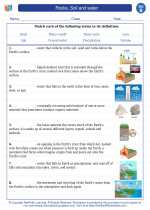Solubility Study Guide
What is Solubility?
Solubility is the ability of a substance, known as the solute, to dissolve in a solvent to form a homogeneous mixture called a solution. The solute can be a solid, liquid, or gas, while the solvent is typically a liquid such as water.
Factors Affecting Solubility:
- Nature of the solute and solvent: Some solutes are more soluble in certain solvents due to their chemical properties.
- Temperature: In general, solubility increases with temperature for solid solutes in liquid solvents, but this relationship can vary for different solute-solvent combinations.
- Pressure: Pressure has a significant effect on the solubility of gases in liquids, where higher pressures generally lead to greater solubility.
Units of Solubility:
Solubility is often expressed in different units depending on the context. Common units include grams of solute per 100 milliliters of solvent, moles of solute per liter of solution, and grams of solute per liter of solution.
Measuring Solubility:
Solubility can be determined experimentally by adding a solute to a solvent and observing whether it dissolves. The maximum amount of solute that can dissolve in a given amount of solvent at a specific temperature is known as the solubility of the solute in that solvent.
Applications of Solubility:
Understanding solubility is important in various fields such as pharmaceuticals, environmental science, and material science. For example, it is crucial in drug formulation to ensure that medications are easily absorbed by the body.
[Solubility] Related Worksheets and Study Guides:
.◂Science Worksheets and Study Guides Second Grade. Rocks, Soil and water

 Worksheet/Answer key
Worksheet/Answer key
 Worksheet/Answer key
Worksheet/Answer key
 Worksheet/Answer key
Worksheet/Answer key
 Vocabulary/Answer key
Vocabulary/Answer key
 Vocabulary/Answer key
Vocabulary/Answer key
